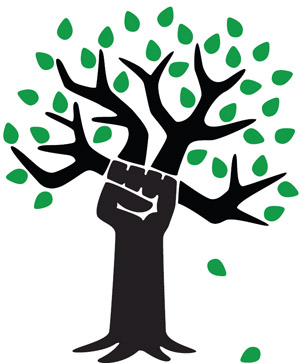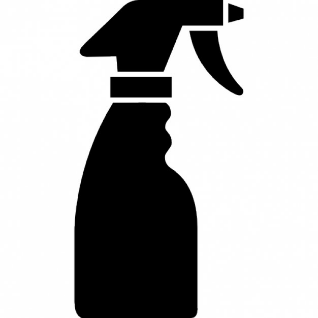We Have A Right To Know What's In Our Household Sprays, Soaps, And Cleaners
But the companies that make them would rather keep their chemical ingredients a secret—even if they might be really bad for you.
Can we trust makers of household cleaning products that their products are safe?
At the moment, we have to. That's because manufacturers like Procter & Gamble, SC Johnson, and Clorox don't disclose all of the chemicals they're using, and they don't show the world how they're deciding what's safe and what isn't.
“The great travesty is that consumers don't have the right-to-know right now.
That's according to a new report from Women’s Voices for the Earth (WVE), a nonprofit that campaigns for greater ingredient disclosure. Though manufacturers now list many more ingredients, they generally do it online (not on the bottle) and some of the terms they use aren't that revealing. Cleaning products contain many "fragrances" whose constituent parts aren't listed, though we know they're sometimes hazardous.
"The great travesty is that consumers don't have the right-to-know right now, which we think is pretty reprehensible," says John Replogle, CEO of Seventh Generation, which makes its own line of cleaning products and wants to see more transparency in the industry. "Under your sink, you have a whole bunch of cleaning products that may have a skull and cross-bone on them and they don't have the ingredients disclosed. You don't know what's in those products."
That's because there is no federal law covering disclosure. Household product manufacturers aren't required to tell us what ingredients they use. The listings on the back of Lysol and Clorox bottles are what manufacturers have chosen to reveal, often under pressure from consumers.
Europe has more comprehensive legislation, called REACH, which it passed in 2006. To sell into the EU, companies must meet a "no data, no market" test that requires producers to know all their ingredients and to know they're all safe. The regulation also calls on companies to substitute chemicals that have been placed on "high concern" lists. The result: Europe has safer household products, and consumers are more informed.
Companies continue to use a much higher standard for their products in Europe than they do here.
"There's a much higher standard of ingredients that can and can't be used [in Europe] than in the U.S.," says Replogle. "Frankly, there's a bit of a double standard. A number of the large consumer goods companies continue to use a much higher standard for their products in Europe than they do here."
Seventh Generation and WVE are supporting a new disclosure law introduced to the California State Assembly. The Cleaning Product Right to Know Act (AB 708) would require manufacturers to name each ingredient both on the product label and on their web site. The law is due for a vote this January and could come into force July 1, 2016. If enacted, the law could lead to wider changes in the U.S. market.
WVE started lobbying manufacturers in 2007 and, over the years, the companies have taken out many chemicals shown by science to be unsafe. In 2011, WVE sent 20 popular cleaning products to an independent laboratory. The labs found reproductive toxins like toluene and phthalates, carcinogens such as 1,4-dioxane and chloroform, a hormone disrupting synthetic musk, and many allergens, even in products marketed as "fragrance free." None of these chemicals were disclosed.
In its latest report, WVE says four manufacturers (SCJ, P&G, RB (formerly Reckitt Benckiser) and Clorox) have removed phthalates, 2-butoxyethanol, and triclosan from their household cleaning products. Clorox and RB no longer use synthetic musks, but Procter & Gamble and SC Johnson still do (in its Glade range).
WVE rates the companies on their ingredient disclosure, chemical screening process and willingness to remove chemicals. Clorox and SCJ get A-minuses for ingredient disclosure. RB gets an 'A' for "responsiveness to consumer concerns." P&G comes off worst. It gets a D score overall.
"We've been tracking these major manufacturers for many years now," says Sarada Tangirala, WVE's national campaigns manager. "We've been talking to them about their product safety and their transparency, plus their overall framework for chemical safety. [P&G has] continued to be the least responsive to our requests and also in their disclosure to the public."
WVE says we need to understand the scientific process by which companies deemed chemicals as safe. Behind the inclusion of all the many chemicals in household products are years of studies, many funded by the companies themselves, and not all of them made public.
"Companies can inspire consumer confidence by being transparent about how their screening models evaluate ingredient toxicity, screen out contaminants, and prohibit ingredients linked to cancer and other serious health harms," the report says.
Replogle says manufacturers hide behind confidentiality clauses covering their fragrances: "A lot of the time what they hide behind is proprietary or confidential information. They say 'we don't want anyone copying our formulas.' What is ridiculous is that I could buy that product today and reverse engineer it and tell you exactly what's in it."
Tangirala points to the fragrance industry itself for the lack of transparency.
"These [chemicals are] added to give off scents but they contain some harmful ingredients. A number of them, like phthalates, are listed by government agencies as chemicals of high concern. The fragrance industry hasn't reviewed the safety," she says. Phthalates, which are found on many plasticized products, have been strongly linked with hormone disruption and baby defects.
Fragrant household cleaners aren't the only category of concern for chemical health campaigners. Colgate-Palmolive has been under a lot of pressure for its use of triclosan in Colgate Total toothpaste (triclosan also appears in many hand soaps). The EU has banned triclosan in anything coming into contact with food and added it to its high concern lists. Colgate continues to point to the product's superior mouth-feel (particularly that it apparently provides "12-hour protection against plaque germs that can lead to gingivitis").
Companies can inspire consumer confidence by being transparent about how their screening models evaluate ingredient toxicity.
The F.D.A. has continued to allow Colgate Total's use of triclosan, despite a slew of studies linking the chemical to cancer and development problems in mice. Following a Freedom of Information Act request (and lawsuit) from Bloomberg News, the F.D.A. in 2014 released all the studies it had been shown by Colgate-Palmolive, giving us an insight into how the manufacturer (and its regulator) evaluate chemical safety.
Retailers like Walmart and Target have put pressure on the manufacturers to be more transparent, asking for fuller ingredient lists than the public gets, Tangirala and Replogle say. They've talked about potentially rewarding companies for taking out certain chemicals (perhaps with better shelf space). For now, though, the retailers won't say what chemicals they're most concerned about.
Replogle is keen to point out the ways Seventh Generation is different (though it's not perfect, according to campaigners). It makes fuller ingredient lists. It takes out fragrances. It relies on plants. It's a Benefit Corporation, which means it needs to account for its impact on society and the environment as much as its bottom line. "We believe in people, planet and profit," he says. "Many large corporations are publicly traded and they're obsequiously focused on the bottom line to the exclusion of what's right for their consumers and the planet around us."
The Issue:
Certain chemicals in cleaning products have been linked to fertility problems, breast cancer, asthma and respiratory disorders, and hormone disruption. What’s more, there is no federal law requiring cleaning product companies to list all the ingredients in their products on the label.
Chicago Greens


